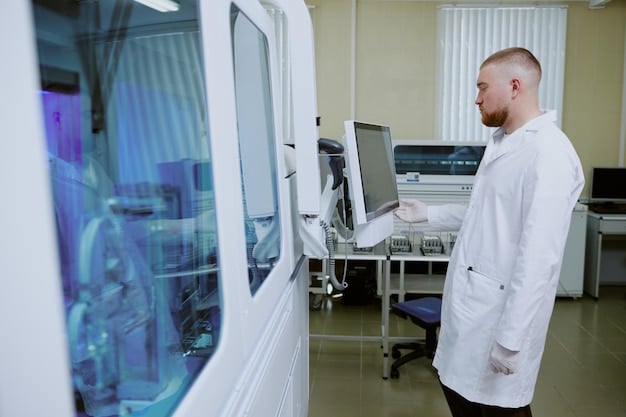The Latest Advancements in Cancer Treatment: A Promising Future

The Latest Advancements in Cancer Treatment: Hope for the Future encompass innovative approaches like immunotherapy, targeted therapy, gene therapy, and advanced radiation techniques, offering improved outcomes and quality of life for patients.
Cancer remains a formidable global health challenge, but The Latest Advancements in Cancer Treatment: Hope for the Future provide reasons for optimism, signalling a new era of more effective and personalized care that can significantly improve outcomes and quality of life for patients.
Understanding Cancer Treatment Advancements
Cancer treatment has evolved significantly in recent decades, transitioning from broad, systemic approaches to more targeted and personalized strategies. This evolution is driven by a deeper understanding of cancer biology and advancements in technology.
The shift towards precision medicine has allowed oncologists to tailor treatments to individual patients based on their specific cancer type, genetic makeup, and other factors. This approach maximizes the effectiveness of treatment while minimizing side effects.
The Role of Immunotherapy
Immunotherapy is a revolutionary approach that harnesses the body’s own immune system to fight cancer. It involves stimulating or enhancing the immune system’s ability to recognize and destroy cancer cells.
The Promise of Targeted Therapy
Targeted therapy focuses on specific molecules or pathways involved in cancer growth and progression. By targeting these molecules, targeted therapies can selectively kill cancer cells while sparing healthy cells.
- Monoclonal antibodies, which bind to specific proteins on cancer cells, marking them for destruction by the immune system.
- Small molecule inhibitors, which block specific enzymes or signaling pathways that promote cancer growth.
- Angiogenesis inhibitors, which prevent the formation of new blood vessels that supply tumors with nutrients.
These advancements offer new hope for patients and highlight the potential for further breakthroughs in cancer treatment. As research continues, personalized medicine and innovative therapies are likely to play an increasingly important role in improving outcomes for cancer patients.

The Rise of Gene Therapy
Gene therapy is an innovative area in cancer treatment that involves modifying a patient’s genes to fight the disease. This approach holds immense potential for correcting genetic defects that contribute to cancer development and enhancing the body’s ability to combat cancer cells.
Several strategies are employed in gene therapy, including introducing new genes, inactivating mutated genes, or modifying genes to boost the immune system’s response to cancer.
CRISPR Technology
CRISPR-Cas9 is a groundbreaking gene-editing technology that enables scientists to precisely target and modify specific DNA sequences within the genome. In cancer treatment, CRISPR can be used to disrupt cancer-causing genes or enhance the effectiveness of other therapies.
Viral Vectors in Gene Therapy
Viruses are often used as vectors to deliver therapeutic genes into cancer cells. These viruses are modified to be harmless and specifically target cancer cells, ensuring that the therapeutic gene is delivered to the intended site.
Gene therapy represents a significant leap forward in cancer treatment, offering the potential for long-term remission and improved quality of life for patients. As research progresses, gene therapy is expected to play an increasingly vital role in the fight against cancer.
Advancements in Radiation Therapy
Radiation therapy has long been a cornerstone of cancer treatment, using high-energy rays to damage and destroy cancer cells. Recent advancements in radiation therapy have improved its precision and effectiveness, while minimizing damage to surrounding healthy tissues.
These advancements include:
- Intensity-modulated radiation therapy (IMRT) allows for precise shaping of the radiation beam to conform to the tumor’s shape, reducing exposure to healthy tissues.
- Stereotactic body radiation therapy (SBRT) delivers high doses of radiation to small, well-defined tumors with extreme accuracy, minimizing treatment time and side effects.
- Proton therapy uses protons instead of X-rays, allowing for more precise targeting of tumors with less radiation exposure to surrounding tissues.
Radiation therapy continues to evolve, offering new options for patients with various types of cancer. These innovations have the potential to improve outcomes, reduce side effects, and enhance the overall quality of life for cancer patients.

The Evolving Landscape of Chemotherapy
While newer therapies like immunotherapy and targeted therapy have garnered much attention, chemotherapy remains a valuable tool in the fight against cancer. Traditional chemotherapy involves using drugs to kill cancer cells, but it can also affect healthy cells, leading to side effects.
Researchers are continuously working to improve chemotherapy by developing new drugs, optimizing treatment regimens, and minimizing side effects.
Personalized Chemotherapy
Personalized chemotherapy involves tailoring the choice of chemotherapy drugs and dosages to individual patients based on their cancer type, genetic profile, and other factors. This approach maximizes the effectiveness of treatment while minimizing side effects.
Novel Chemotherapy Drugs
Researchers are continuously developing new chemotherapy drugs with novel mechanisms of action. These drugs may be more effective against specific types of cancer and have fewer side effects than traditional chemotherapy drugs.
Chemotherapy continues to play an important role in cancer treatment, and ongoing research is focused on improving its effectiveness and reducing side effects. Personalized approaches and novel drugs hold promise for enhancing the benefits of chemotherapy while minimizing its impact on patients’ quality of life.
The Importance of Early Detection and Screening
Early detection and screening play a crucial role in improving outcomes for cancer patients. When cancer is detected at an early stage, it is often more treatable and curable. Screening tests can help identify cancer before symptoms develop, allowing for earlier intervention.
Examples of cancer screening tests include:
- Mammography for breast cancer
- Colonoscopy for colorectal cancer
- Pap smear for cervical cancer
- PSA test for prostate cancer
Liquid Biopsies
Liquid biopsies are a non-invasive approach to detect cancer early by analyzing blood samples for circulating tumor cells, DNA, or other biomarkers. This technology holds great promise for early detection and monitoring of cancer.
Artificial Intelligence in Screening
Artificial intelligence (AI) is increasingly being used to improve the accuracy and efficiency of cancer screening. AI algorithms can analyze medical images, such as mammograms and CT scans, to detect subtle signs of cancer that may be missed by human observers.
Early detection and screening are essential components of cancer prevention and control. By detecting cancer at an early stage, patients have a better chance of successful treatment and long-term survival. Ongoing research and technological advancements are focused on improving the accuracy and accessibility of cancer screening tests.
Focus on Integrative and Supportive Care
Integrative and supportive care focuses on addressing the physical, emotional, and psychological needs of cancer patients throughout their treatment journey. This approach recognizes that cancer treatment can have a significant impact on patients’ overall well-being, and aims to provide comprehensive support to help them cope with these challenges.
Integrative care encompasses a wide range of therapies and interventions, including:
Supportive care is an essential aspect of cancer treatment, helping patients manage side effects, improve their quality of life, and enhance their overall well-being. By addressing the holistic needs of cancer patients, integrative and supportive care can make a significant difference in their treatment experience and outcomes.
- Nutritional counseling to help patients maintain a healthy diet and manage treatment-related side effects.
- Exercise programs to improve physical function, reduce fatigue, and enhance mood.
- Mind-body therapies, such as meditation and yoga, to reduce stress, anxiety, and pain.
| Key Point | Brief Description |
|---|---|
| 🔬 Immunotherapy | Uses the body’s immune system to fight cancer cells. |
| 🧬 Gene Therapy | Modifies genes to correct defects or enhance immune response. |
| 🎯 Targeted Therapy | Focuses on specific molecules involved in cancer growth. |
| 🧪 Liquid Biopsies | Detects cancer early via blood samples and biomarkers. |
Frequently Asked Questions
▼
Immunotherapy uses your body’s own immune system to fight cancer. It enhances or stimulates the immune system to recognize and destroy cancer cells, marking a revolutionary shift in cancer treatment.
▼
Targeted therapy zeroes in on specific molecules or pathways that fuel cancer growth. By blocking these targets, it selectively kills cancer cells while minimizing harm to healthy cells. It’s a cornerstone of precision medicine.
▼
Early cancer detection through regular screenings like mammograms or colonoscopies significantly improves treatment outcomes. Detecting cancer early means it’s often more manageable and curable, enhancing long-term survival rates.
▼
Gene therapy shows immense promise by modifying genes that contribute to cancer. While not a cure-all solution yet, it offers the potential for long-term remission and improved quality of life, representing a significant step forward.
▼
Supportive care is crucial as it addresses the overall well-being of cancer patients. It includes nutritional counseling, exercise, and mind-body therapies to reduce stress, manage side effects, improve quality of life, and enhance treatment adherence.
Conclusion
The landscape of cancer treatment is continuously evolving, with each advancement contributing to greater efficacy and improved patient outcomes. The Latest Advancements in Cancer Treatment: Hope for the Future lies in personalized approaches, innovative therapies, and comprehensive supportive care. These developments signify a promising shift toward a future where cancer is not just treated but also conquered.





